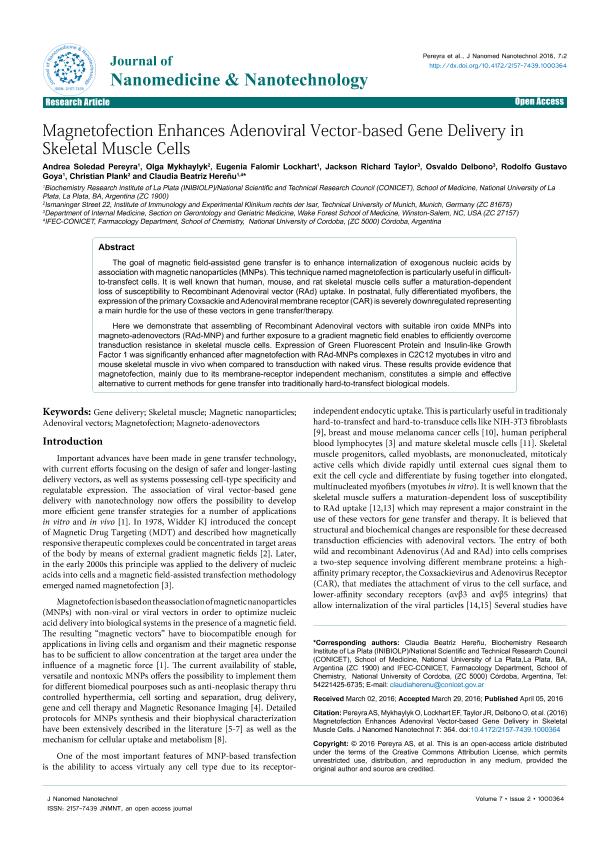Artículo
Magnetofection Enhances Adenoviral Vector-based Gene Delivery in Skeletal Muscle Cells
Pereyra, Andrea Soledad ; Mykhaylyk, Olga; Falomir Lockhart, Eugenia
; Mykhaylyk, Olga; Falomir Lockhart, Eugenia ; Taylor, Jackson Richard; Delbono, Osvaldo; Goya, Rodolfo Gustavo
; Taylor, Jackson Richard; Delbono, Osvaldo; Goya, Rodolfo Gustavo ; Plank, Christian; Hereñú, Claudia Beatriz
; Plank, Christian; Hereñú, Claudia Beatriz
 ; Mykhaylyk, Olga; Falomir Lockhart, Eugenia
; Mykhaylyk, Olga; Falomir Lockhart, Eugenia ; Taylor, Jackson Richard; Delbono, Osvaldo; Goya, Rodolfo Gustavo
; Taylor, Jackson Richard; Delbono, Osvaldo; Goya, Rodolfo Gustavo ; Plank, Christian; Hereñú, Claudia Beatriz
; Plank, Christian; Hereñú, Claudia Beatriz
Fecha de publicación:
04/2016
Editorial:
OMICS International
Revista:
Journal of Nanomedicine & Nanotechnology
ISSN:
2157-7439
Idioma:
Inglés
Tipo de recurso:
Artículo publicado
Clasificación temática:
Resumen
The goal of magnetic field-assisted gene transfer is to enhance internalization of exogenous nucleic acids by association with magnetic nanoparticles (MNPs). This technique named magnetofection is particularly useful in difficult-to-transfect cells. It is well known that human, mouse, and rat skeletal muscle cells suffer a maturation-dependent loss of susceptibility to Recombinant Adenoviral vector (RAd) uptake. In postnatal, fully differentiated myofibers, the expression of the primary Coxsackie and Adenoviral membrane receptor (CAR) is severely downregulated representing a main hurdle for the use of these vectors in gene transfer/therapy. Here we demonstrate that assembling of Recombinant Adenoviral vectors with suitable iron oxide MNPs into magneto-adenovectors (RAd-MNP) and further exposure to a gradient magnetic field enables to efficiently overcome transduction resistance in skeletal muscle cells. Expression of Green Fluorescent Protein and Insulin-like Growth Factor 1 was significantly enhanced after magnetofection with RAd-MNPs complexes in C2C12 myotubes in vitro and mouse skeletal muscle in vivo when compared to transduction with naked virus. These results provide evidence that magnetofection, mainly due to its membrane-receptor independent mechanism, constitutes a simple and effective alternative to current methods for gene transfer into traditionally hard-to-transfect biological models.
Palabras clave:
Gene Delivery
,
Skeletal Muscle
,
Magnetic Nanoparticles
,
Adenoviral Vectors
Archivos asociados
Licencia
Identificadores
Colecciones
Articulos(IFEC)
Articulos de INST. DE FARMACOLOGIA EXPERIMENTAL DE CORDOBA
Articulos de INST. DE FARMACOLOGIA EXPERIMENTAL DE CORDOBA
Articulos(INIBIOLP)
Articulos de INST.DE INVEST.BIOQUIMICAS DE LA PLATA
Articulos de INST.DE INVEST.BIOQUIMICAS DE LA PLATA
Citación
Pereyra, Andrea Soledad; Mykhaylyk, Olga; Falomir Lockhart, Eugenia; Taylor, Jackson Richard; Delbono, Osvaldo; et al.; Magnetofection Enhances Adenoviral Vector-based Gene Delivery in Skeletal Muscle Cells; OMICS International; Journal of Nanomedicine & Nanotechnology; 7; 2; 4-2016; 1-11
Compartir
Altmétricas



